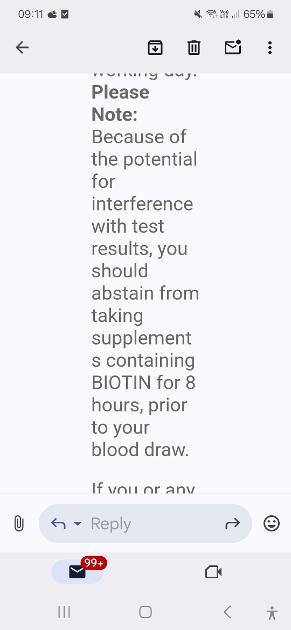This was sent as advice from blue horizon, just thought it interesting them saying to stop biotin 8 hours prior to testing.
Interesting advice from blue horizon re testing... - Thyroid UK
Interesting advice from blue horizon re testing & biotin supplements

Featured Content
Jump to repliesThe MHRA appears to be requiring the texts below to be included in the Patient Information Leaflets for all levothyroxine products.
If you are about to undergo laboratory testing for
monitoring your thyroid hormone levels, you must
inform your doctor and/or the laboratory personnel
that you are taking or have recently taken biotin (also
known as vitamin H, vitamin B7 or vitamin B8). Biotin
may affect results of your laboratory tests. Depending
on the test, the results may be falsely high or falsely
low due to biotin. Your doctor may ask you to stop
taking biotin before performing laboratory tests. You
should also be aware that other products that you
may take, such as multivitamins or supplements for
hair, skin, and nails could also contain biotin. This
could affect the results of laboratory tests. Please
inform your doctor and/or the laboratory personnel, if
you are taking such products (Please note the
information in section Other medicines and
Levothyroxine).
AND
Other medicines and Levothyroxine Tablets
Tell your doctor or pharmacist:
- if you are taking, have recently taken or might take any other medicines. This includes
over the counter medicines, herbal remedies and vitamin supplements. Many medicines
affect the way levothyroxine works. The effects of other drugs may also be affected by
levothyroxine
- if you are taking or have recently taken biotin, you must inform your doctor and/or the
laboratory personnel when you are about to undergo laboratory testing for monitoring
your thyroid hormone levels. Biotin may affect results of your laboratory tests (see warnings
and precautions)
AND
• biotin, you must inform your doctor and/or the
laboratory personnel when you are about to
undergo laboratory testing for monitoring your
thyroid hormone levels. Biotin may affect results of
your laboratory tests (see warnings and
precautions).
mhraproducts4853.blob.core....
Looks like they are still working their way through all PILs as some do not yet have this - and the ones that do seem to have been updated relatively recently (at least in 2024).
I feel that while it is right to get this information out, it is causing lots of worry and concern. To a large extent unnecessarily. There seems now to be more information about biotin than anything else in these PILs. Over 10% of the words!
But the actual impact of low doses (e.g. 50 micrograms) in a supplement do not appear significant - at least, not if a few hours pass.
And few take genuinely high doses where the original problem was identified.
And, really and truly, it should be the test manufacturers acting to ensure these issues do not exist rather than patients.
And, do they really expect each and every one of us to tell our doctors and the laboratory personnel every single time we have a blood test?
And, they assume that blood draws are by doctors or laboratory personnel. Yet many of us have it drawn by a practice or other non-laboratory phlebotomist or nurse, or ourselves (fingerprick or Tasso for private tests), etc. They completely ignore physician assistants!
All they're doing is trying to cover all eventualities, because there's a minority of people that insist on taking mega-doses of it wrongly thinking it's going to cure their hair/nail issues. Normal doses do not cause any issue with the immunoassay, unless you pop the pills shortly before (and why would anyone think it's a good idea to take supplements right before a blood test?)
Biotin is commonly used in many types of immunoassay as it forms a good protein bond, and the tests are unaffected by dietary and normal supplemental Biotin. It has only become an issue because companies are churning out supplements with 10000x RDA mega-doses (way beyond the tested/proven safe upper-limit) claiming to fix Nail/Hail problems.
Really there should be a big warning label on these type of supplement bottles, rather than every doctor/lab having to specifically ask a patient if they're taking a stupid dose amount of something they don't need.
I couldn't agree more. For some people, all it takes is a mention on facebook or a blog and they start adding a supplement to their already vast list of random pills. It's scary to think how these could interact with each other, with possible negative affects on the liver/kidney.
Occassionally it's okay. Take B12 for example, research shows 1-3% can be absorbed through passive infusion, so if you have P.A or similar, a mega dose "may" be enough (worth a shot). And B12 megadoses don't seem to be a problem for the body (assuming kidney function is okay). But we all know this from researching ourselves, and assessing the risk. But research is lacking for the majority of supplements, and people don't seem to care or think about the risks.
The other issue, is how can labs/hospitals gaurantee all of their tests are accurate when people are mega dosing uncommon supplements, and taking strange concoctions of herbs, plants, powered unicorn horn, dried badger testicles etc etc.